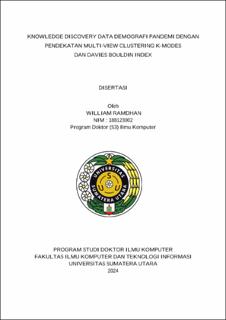Knowledge Discovery Data Demografi Pandemi dengan Pendekatan Multi-View Clustering K-Modes dan Davies Bouldin Index
Knowledge Discovery of Pandemic Demographic Data with K-Modes Multi-View Clustering Approach and Davies Bouldin Index

Date
2024Author
Ramdhan, William
Advisor(s)
Sitompul, Opim Salim
Nababan, Erna Budhiarti
Sawaluddin
Metadata
Show full item recordAbstract
The uneven spread of the pandemic in terms of prevalence and speed of spread is due to the role of social, economic and demographic factors and which allows the number of pandemic cases to increase to a higher level. Proper analysis of demographic factors can provide information in mapping conditions as well as provide new knowledge about the causes of pandemics, as is the case with the Covid-19 pandemic. In general, information on pandemic factors is seen from age and gender, the problem is that there are still other demographic factors that can influence the pandemic, such as education, employment, history of physical contact and area of residence (domicile), so that using complex demographic data can produce useful knowledge discovery related to the pandemic. This research aims to produce new knowledge discoveries to determine the dominant demographic factors that cause the pandemic through optimal grouping obtained in stages from a number of points of view. The approach used is Multi-view Clustering (MvC) with the K-Modes algorithm. Cluster optimization was obtained through the Davies Bouldin Index (DBI) evaluation technique which was supported by Pearson, Kendall's, Spearman testing and Exploratory Data Analysis (EDA). The results of this research are knowledge discovery of Covid-19 demographics with high scalability, efficiency and data accuracy reaching 98%. These results are the latest from this research.
